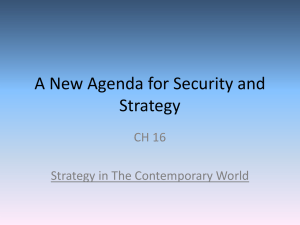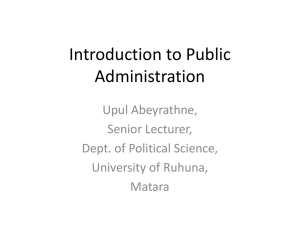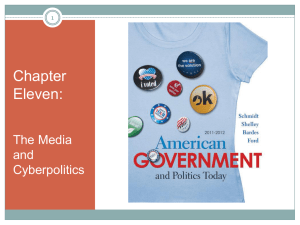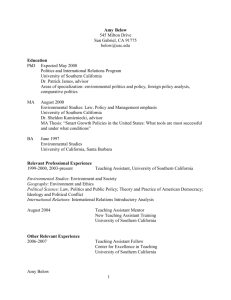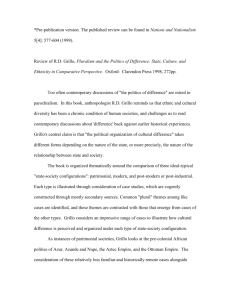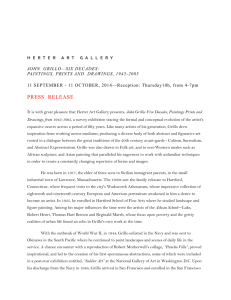Only_social_media_can_fix_the_crisis_of_modern_politics
advertisement
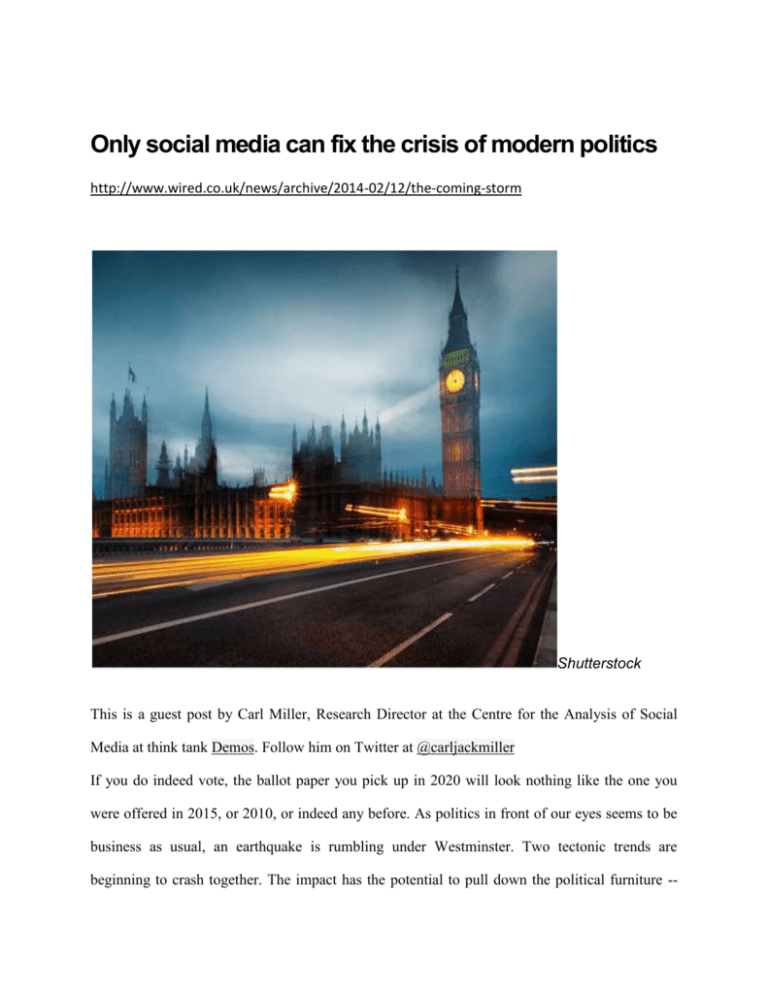
Only social media can fix the crisis of modern politics http://www.wired.co.uk/news/archive/2014-02/12/the-coming-storm Shutterstock This is a guest post by Carl Miller, Research Director at the Centre for the Analysis of Social Media at think tank Demos. Follow him on Twitter at @carljackmiller If you do indeed vote, the ballot paper you pick up in 2020 will look nothing like the one you were offered in 2015, or 2010, or indeed any before. As politics in front of our eyes seems to be business as usual, an earthquake is rumbling under Westminster. Two tectonic trends are beginning to crash together. The impact has the potential to pull down the political furniture -- the familiar reds and blues, the comforting dividing lines, the same basic choices -- that we have grown used to over generations. Anti-politics, both here and across Europe has become the predominant mood The first of these trends is the crisis of modern politics. For fifty years, mainstream politics has been trapped in a downward spiral. Mainstream political parties have lost millions of members -now just 2 perecent of the electorate. In 1950, 84 percent of the electorate turned out to vote. In 2010, it was 65 percent, and less than half of voters under the age of 24. Only a third of young people have an interest in politics, and only half think it's their duty to vote. Turnout is predicted to continue to decrease as they comprise a higher and higher share of the electorate. There are concerns the 2014 European Parliamentary elections will have a dismal turnout, at the same time as being the most important and consequential in the history of the EU. Underlying this has been a free-fall in our attitudes towards politics; our sense of its ability to meaningfully and positively change our lives. Around 80 percent of us simplydon't trust what they say. Last year, Ipsos MORI's poll showed that politicians are trusted less than estate agents or (gasp) bankers. From expenses and lobbying scandals to The Thick of it and regular Paxman grilling, our representatives have received a decades-long media and cultural battering. Antipolitics, both here and across Europe has become the predominant mood. The second trend is the rise of social media, and the increasingly political uses to which it is put. It is now, of course, the predominant way the internet is used. Over half of British adults now regularly log onto a social media platform. Of every hour we spend online, 13 minutes are on social media -- more than on entertainment, shopping, checking the news, email or anything else. Social media is taking a more and more political turn. Young people are not disengaged about political issues -- actually, they are probably as engaged as any other generation. They are turning to social media to pursue their beliefs and passions for a better world outside of those mainstream institutions that they trust so little. From groups that sit outside the mainstream like the English Defence League (which Jamie Bartlett has called a "Facebook group with a streetbased wing") to all kinds of volunteering, activism and passionate debate -- both legitimate and illegitimate -- this "para-political" activity is now a potent and growing phenomenon. Sooner rather than later, social media will change how formal politics is done too. We only need to look over to Italy to see how a tired, distrusted political status quo and cynical electorate has mixed with social media to create new political realities. That example is Beppe Grillo: a grizzled, angry Italian comedian with no history of politics. Grillo had a million Facebook friends, a million Twitter followers and the most popularblog in Italy. This following became the Five Star Movement -- a furious, insurgent anti-corruption groundswell that contested the last elections, in 2013. Grillo didn't play by the rules. He refused to give interviews to mainstream press, called Berlusconi a "psycho-dwarf"; he wouldn't even (under his Movement's own rules) take office himself. He had no lackeys in the press or TV. He had no big business funders. It didn't matter. Demos studied Beppe Grillo and his movement as it grew. We realised a new kind of politics was taking shape. Social media gave him a voice, and a party (political not recreational) machine. He used Meetup groups around the world to build an army of volunteers to win what electoral strategists called the "ground game". We estimated that he had around 250,000 people who considered themselves members of his party. It worked: in a year, he came from nowhere to win 1 in every 4 votes -- a massive 10 points higher than where the polls put him. Here in the UK, the rise of Nigel Farage and UKIP shows us how powerful the antiestablishment message can be. A poll at the beginning of the year put UKIP above all other as the most "liked" political party in the UK. But this reflects more how turned off people are with the mainstream, than anything to do with UKIP. Their message is not a uniting one, and cutting into the Europhobic wings of Labour and the Conservatives is unlikely to win him an election. Nor will dodgy appointments, or an abject lack of policies. UKIP is rigidly hierarchical, and is no better at social media than any of its establishment competitors. When the crisis of modern politics and the rise of social media finally and truly come together, the outcome will be a decisive transformation in the British political landscape. A charismatic voice will rise with an angry, insurgent, anti-incumbent message that will appeal to people across the political spectrum. The message is likely, like the messenger, to not reflect current political consensuses and divisions. They may call for a radical house-building programme, an increase in the minimum wage and free care for the elderly at the same time as a ban on immigrant benefits and reduction in support for the BBC. Most of all, they will harness the enormous power of social media to level the playing field with mainstream parties. Much like Beppe Grillo, they will use it as a costless platform for promotion and party organisation wrapped into one. The door of British politics is already hanging open: before long, someone will use social media to knock it off its hinges.






